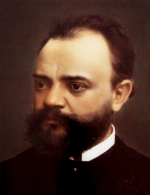|
Xtend
 Listen
Listen
 Period
Period
 Country
Country
 Notes
Notes
 Quotation
Quotation
 Projects
Projects
 Dictionary
Dictionary
 Finders
Finders
|

Born: 8 September 1841, Nelahozeves,
Czech Republic (Bohemia)
Died: 1 May 1904, Prague, Czech
Republic (Bohemia)
Dvorák, Antonín
In his childhood, Dvorák,
son to a poor family, began working as his father's apprentice butcher,
but, fortunately, his father was convinced to let him learn to play the
organ ,
and so he also experienced orchestral music that fascinated him. He played
first viola ,
and so he also experienced orchestral music that fascinated him. He played
first viola in Prague's
in Prague's theatre orchestra, conducted by Smetana
theatre orchestra, conducted by Smetana .
At the same time, as the leading exponent of Czech musical nationalism .
At the same time, as the leading exponent of Czech musical nationalism with Smetana,
he composed music based on Bohemian (now Czech)
folklore, combined with the conventional forms
of Classic music. His Slavonic Dances
with Smetana,
he composed music based on Bohemian (now Czech)
folklore, combined with the conventional forms
of Classic music. His Slavonic Dances  ,
written under the inspiration of Bohemian folk music, are very famous.
In a contest he won, one of the judges was Brahms ,
written under the inspiration of Bohemian folk music, are very famous.
In a contest he won, one of the judges was Brahms ,
who was impressed by him and aided the publication of his work. His striking
success around Europe
brought about his greatest pieces, particularly his 7th
Symphony. ,
who was impressed by him and aided the publication of his work. His striking
success around Europe
brought about his greatest pieces, particularly his 7th
Symphony.
 He
was appointed director of the National Conservatoire in New
York He
was appointed director of the National Conservatoire in New
York  ,
were he wrote his best-known masterpiece - Symphony
no. 9 "From the New World" ,
were he wrote his best-known masterpiece - Symphony
no. 9 "From the New World"  ,
in which he incorporated many elements of
native American and black folk music ,
in which he incorporated many elements of
native American and black folk music .
He included similar materials in his chamber work - The
String Quartet No. 12 in F major, "The American".
On his return to Prague,
he was already an admired national composer. .
He included similar materials in his chamber work - The
String Quartet No. 12 in F major, "The American".
On his return to Prague,
he was already an admired national composer.
Dvorák died in 1904, shortly
after the first performances of his last opera, "Armida".


Dvorák on the WWW
 Sites
Sites
|
 Audio
Audio
|
 Video
Video
|
 Images
Images
|
 MIDI
MIDI
|
|
Description
He played


He Lived in the
 Romantic period
Romantic period
In
 Czech
Czech
|